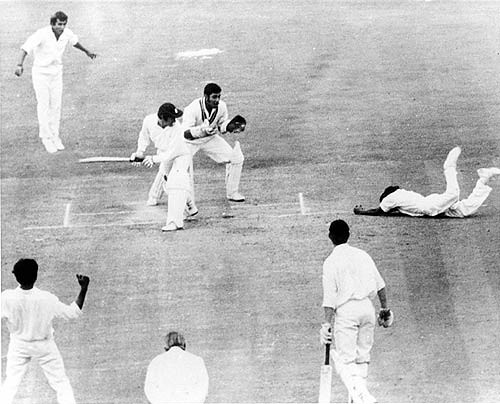Solkar’s approach towards taking tough catches is a life lesson
By K.R. Nayar
Forward short-leg is
that fielding position which will always remind us of the late Eknath Solkar
who pulled off some breath-taking catches from there. His view on taking tough
catches can inspire people who give up their mission when the going gets tough.
Solkar's determination was tough to beat.

Eknath Solkar's catches Alan Knott during India's historic win over England
August 24, 1971, will remain an unforgettable day for Indian cricket fans. On this day, India recorded its first series win over England at the Oval ground. Most times, when this historic moment is mentioned, the picture depicting the victory is that of Eknath Solkar’s diving catch of England wicketkeeper Alan Knott off S.Venkataraghavan at forward short leg.
Solkar was one of the great cricketers whom I
wanted to meet personally when I reached Mumbai to pursue a career in
journalism. By the time I met him it was over a decade since he had retired
from the game. During our first meeting I told him how, as a schoolboy, I'd
prayed for him when he'd slowed down while he was in his nineties before
recording his first and only Test century against the mighty West Indies in
1974. His reply touched me: “It is only because of the blessings of many
cricket lovers that I became what I am. I am happy that I still remain in the
hearts of many Indians."

Eknath Solkar's catches Basil D'Olivera out of the blue at Lord's in 1971
After our first meeting, when I was about to
leave, he asked me: “When do we meet next?” I was surprised by this question
because it is rare that a famous cricketer makes such a courteous query. Since
mobile phones did not exist in those days, he gave me his residence number, and
we met many times after that. In each of our meetings, I would ask him to
share an incident from his cricketing career and he would patiently oblige me.
Once I travelled with him to Baroda (in Gujarat)
by train for a Ranji Trophy match when he was one of the selectors for the
Mumbai team. That was when he narrated his life story to me and how tough his
life had been throughout. He was the son of a groundsman at the P.J. Hindu
Gymkhana in Mumbai, and lived in a one-room living space with his five siblings
and parents.
What I've always admired about
Solkar was his guts to stand at forward short leg, waiting for that bat and pad
catch. Those were the days when the helmet was not introduced. Every time
someone mentions a fielder at the forward short leg position, the first name
that comes to my mind is that of Solkar. Solkar’s response to my query on
how he took those flying catches is worth emulating. “Try hard and you can get
them. Most of the catches I took were almost impossible. I've only tried hard
and they yielded,” he said.
So when people say that some tasks are impossible and that they do not know how to achieve it, I always give Solkar's example.

Eknath Solkar catches Keith Fletcher at the Oval in 1971
His career is also an example of how despite coming from a very humble background one can make it to the Indian team. I also remember him telling me that he would have remained a groundsman as his father had it not been for Madhav Mantri, a former Indian wicketkeeper and maternal uncle of Sunil Gavaskar, who helped him out. Solkar used to bowl to Mantri at the Gymkhana nets, and seeing with his enthusiasm, Mantri helped him complete his schooling. Solkar then went on to captain the Indian schools' team.
Former England captain Tony Lewis gave Solkar the greatest compliment once
while speaking at a function held at the Cricket Club of India (CCI). “It was
tough to play the three great Indian spinners with this man (Solkar) hanging
around as if he wanted to pick my back pocket.” Very few may recall that when
India was shot out for 42 in the Lord’s Test in 1974, he was the only batsman to
reach double figures and remain unbeaten on 18! He once told me the story
of how Australian skipper Bill Lawry presented him with his bat for taking his
brilliant catch.
Towards the end, Solkar developed leucoderma, a skin disorder. A few years
before his death he'd called me to find out if the Emirates Cricket Board (ECB)
would consider him as their coach. Unfortunately, ECB had already signed a
contract with another coach. Solkar’s death in 2005 at the age of 57
shocked me.
Though Solkar was addressed as ‘Mini Gary Sobers’ for his all-round skills, in
the 1971 series against West Indies he is said to have told Sobers to 'mind his
business'. During one of the Test matches, when the umpires changed the ball
that went out of shape and picked another ball, Solkar requested the umpires to
show him the ball that was chosen. This irritated skipper Sobers, who said:
“‘What’s the point? You will play and miss anyway,” Solkar immediately
retorted: “You play your game, we will play ours.”
That’s Solkar, who never feared to take close-in catches or bothered who his
opponent was since his focus was to help India win. No wonder he was also
called ‘Mr. Dependable’ for this very reason.




Wonderful story... It's like reliving those bygone days. The comment about picking the back pocket is hilarious.
ReplyDeleteYes, he was the most fearless fielder at forward short leg, that too without a helmet. Nice of you to have remembered him and revealed these interesting tit bits.
ReplyDelete